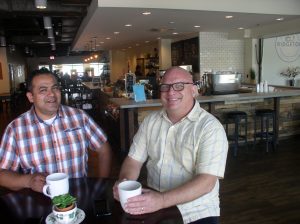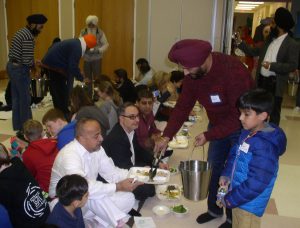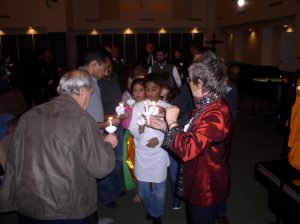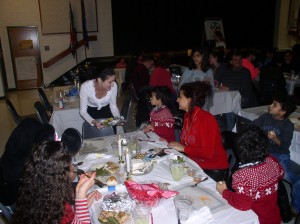
Ridgetop Coffee & Tea is not your ordinary coffee shop.
The Washington Post, August 13, 2017
Words, music, images and more from Jim Barnes

Ridgetop Coffee & Tea is not your ordinary coffee shop.
The Washington Post, August 13, 2017
When Ruth Everhart was a senior at a small Christian college, she and four of her roommates were held captive and brutally raped at gunpoint by two masked intruders.
Although she survived the ordeal, she was filled with shame and worried that she had been “ruined” — in the eyes of God, her family and the man she might one day marry. Her devastating experience shook her faith in God, and eventually led her to break with the conservative Protestant denomination in which she had been raised.
Last year, Everhart, 59, of Sterling, published her memoir, “Ruined,” in which she recounts the crime in detail and traces the twists and turns her life took in the months and years that followed. She tells how that journey took her through dark places — a breakup with her boyfriend, an affair with a married man, and conflicts with friends and family.
The Washington Post, Feb. 12, 2017
Except for a lone cow, the stable stands empty in the Nativity scene at Grace Episcopal Church in the Fauquier County town of The Plains.
The creche is unlike those commonly seen in churches and front yards beginning the month before Christmas, typically featuring figures of Mary, Joseph and the baby Jesus in the stable, often joined by shepherds, angels, wise men and animals.
Instead, the scene is an imaginative, highly detailed, miniature representation of life in the city of Bethlehem. Townspeople are seen going about their daily business of baking bread, weaving fabric and even taking a nap. As the holiday approaches, more figures will be added to the scene to illustrate the Christmas story.
Full story
Over the past two decades, Brian Whelan has created countless paintings of holy cities, which he describes as “thin places where heaven and Earth seem so close as to actually touch.”
Whelan, who lives in the western Loudoun County village of Waterford, is particularly fascinated by the idea of cities where shrines, temples, cathedrals and mosques attract pilgrims of the three Abrahamic faiths — Judaism, Christianity and Islam — coexisting in peace and harmony.
Nine of Whelan’s paintings are on display in “Holy City,” an exhibition running through January at the Washington National Cathedral. The works are arranged in rows of three, forming a 9-by-12-foot mural in which the scenes blend seamlessly. Having exhibited his works at the cathedral previously, he approached officials about displaying his paintings of holy cities, which he had completed over two years.
Washington Post, December 4, 2016

About 250 Loudoun County residents from an array of local religious groups — Baha’i, Buddhist, Christian, Hindu, Jewish, Muslim, Sikh and Unitarian Universalist — came together Nov. 20 for an evening of food, fellowship, prayer and entertainment. Organized by Loudoun Interfaith BRIDGES, the eighth annual Day of Thanks was held at Crossroads United Methodist Church in Ashburn.
“Thanks” was the theme, but the event was also a celebration of Loudoun’s cultural diversity. Many of the organizers and guests emphasized the importance of people from different faith groups coming together to gain understanding and build relationships.
Washington Post, Nov. 27, 2016


Jeffrey Jackson wants to be able to show his grandson the church where his ancestors worshiped, near the graves where they are buried.
Reginald Simms envisions a museum honoring Loudoun County’s African American veterans.
Lee Lawrence would like to see a display depicting the long-standing ties between white Quakers and the African American community in the western Loudoun village of Lincoln.
Area residents offered these and other ideas for restoring the abandoned Grace Church building during a four-hour design workshop last month at the Goose Creek Friends Meeting House in Lincoln. Architects then sketched drawings showing how the two-story stone structure that housed an African American congregation from the 1880s through the 1940s might be restored and put to use.
Washington Post, May 8, 2016
More than 200 people gathered in front of the old courthouse in downtown Leesburg Thursday, Dec. 17, in a silent vigil for a diverse and united community. Participants represented a diverse blend of faith traditions, including Christian, Jewish, Muslim, Sikh, Bahá’í, Unitarian, Hindu and Buddhist groups.
The participants convened at Leesburg Presbyterian Church before walking three blocks to the intersection of Kind and Market streets, where they stood silently during the vigil.

Members of Ashburn-based Muslim, Jewish and Christian faith communities united last Sunday evening to serve a free restaurant-style meal to people who seldom have the opportunity to dine out.
The event was the most recent in a series of Community Table dinners organized to provide a fine dining experience for low-income individuals and families. Members of two or more faith communities have joined to host most of the dinners, giving them the opportunity to build interfaith friendships while serving people in need, organizers said.
Washington Post, December 13, 2015

When the Rev. John Ohmer was named rector of the Falls Church Episcopal in September 2012, he faced the challenge of rebuilding a historic church that had lost most of its membership in a split with conservatives, primarily over the issue of ordaining openly gay clergy.
In late 2006 and early 2007, more than 90 percent of the 2,200 members of the church — which dates to Colonial times — voted to leave the Episcopal church and form the Falls Church Anglican.
Washington Post, September 16, 2015
It feels like death is being shoved in my face today.
I’ve been reading a book called Listening to Your Life, a compilation of daily meditations by Frederick Buechner. The reading for today was about Jesus’s death on the cross, and how that was a good thing for humanity. This is a concept that, try as I might, I have never been able to fully understand or appreciate.
This awakened memories of the horrific shootings at Virginia Tech that occurred exactly eight years ago, a murderous spree that hit very close to home. I would like to think that something good came from that awful tragedy, but for the life of me I am coming up empty.
I opened the Washington Post and read about the suicide of a sophomore at William and Mary, my son’s alma mater. The young man, Paul Soutter, was to have appeared in a play about the stresses of college life. He was the fourth W & M student to take his own life this year.
On Instagram, I saw freshly posted images of my friend Lacey, who took her life almost two years ago. Her friends still regularly send messages through social media saying how much they loved and miss her. She had seemingly been unaware of how many people cared about her.
I circle back to the reading from Buechner, and try again to understand how anything good can come from the death of young people. If anything, for me, it is this awareness: Life is precious. Protect it, cherish it.